Archives - Page 2
-
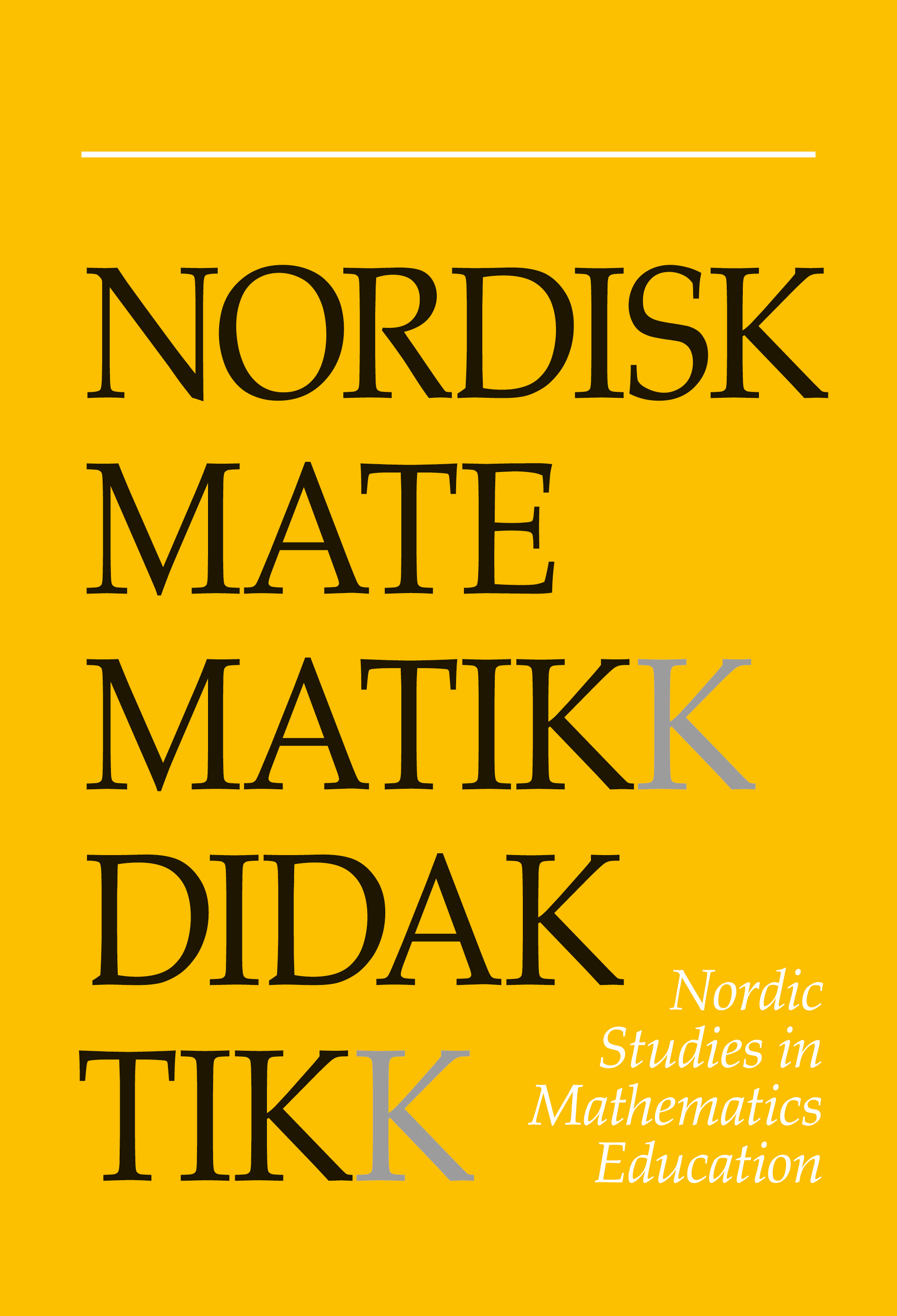
Vol. 23 No. 1 (2018)
Editorial
Anna Ida Säfström
Preschoolers exercising mathematical competenciesMagnus Fahlström and Lovisa Sumpter
A model for the role of the physical environment in mathematics educationKristina Palm Kaplan
Discourses in school algebra: the textbooks’ different views on algebra and the positioning of studentsJani Hannula
The gap between school mathematics and university mathematics: prospective mathematics teachers’ conceptions and mathematical thinking -
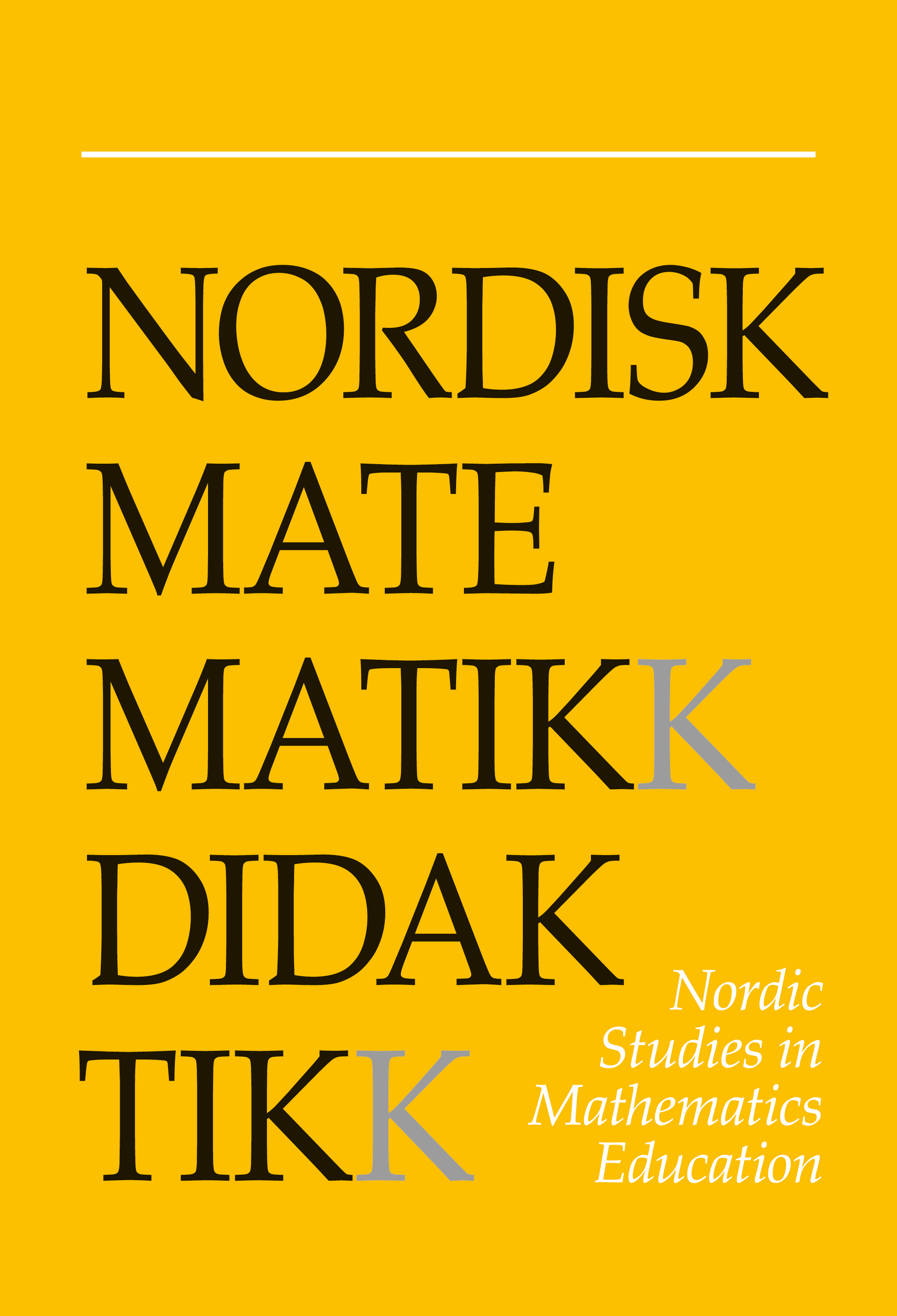
Vol. 22 No. 4 (2017)
Editorial
Simon Goodchild and Barbara Jaworski
Developing practice through research into university mathematics educationAngeliki Mali and Georgia Petropoulou
Characterising undergraduate mathematics teaching across settings and countries: an analytical frameworkSuela Kacerja, Toril Eskeland Rangnes, Rune Herheim, Meinrad Pohl, Inger Elin Lilland and Ragnhild Hansen
Stimulating critical mathematical discussions in teacher education: use of indices such as the BMI as entry pointsMervi A. Asikainen, Antti Viholainen, Mika Koponen and Pekka E. Hirvonen
Finnish entry-level students’ views of teacher knowledge and the characteristics of a good mathematics teacherSinéad Breen, Niclas Larson, Ann O’Shea and Kerstin Pettersson
A study of students’ concept images of inverse functions in Ireland and SwedenMargrethe Naalsund and Joakim Skogholt
Oral presentations as a tool for promoting metacognitive regulation in real analysisStephanie Treffert-Thomas, Olov Viirman, Paul Hernandez-Martinez and Yuriy Rogovchenko
Mathematics lecturers’ views on the teaching of mathematical modellingIan Jones and David Sirl
Peer assessment of mathematical understanding using comparative judgementBarbro Grevholm
Bokanmälan -
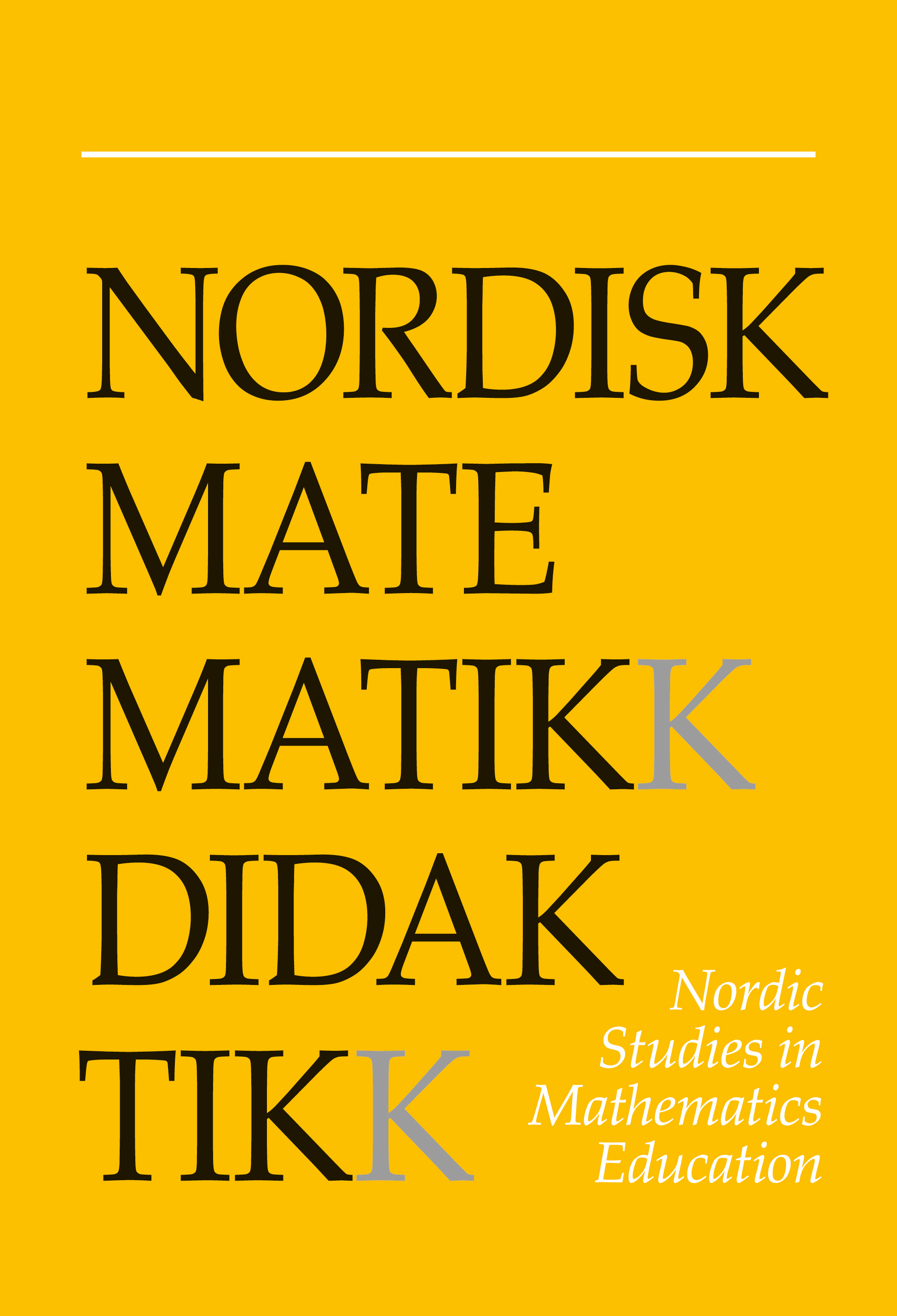
Vol. 22 No. 3 (2017)
Editorial
Sharada Gade
Research as praxis, en route theory/practice teacher-researcher collaboration: a self-studyTorulf Palm, Catarina Andersson, Erika Boström and Charlotta Vingsle
A review of the impact of formative assessment on student achievement in mathematicsAndreas Eckert
Theorizing the interactive nature of teaching mathematics: contributing to develop contributions as a metaphor for teachingAnnette Hessen Bjerke
The development of pre-service teachers’ self-efficacy in teaching mathematicsPaul Andrews and Niclas Larson
Analysing genomgång: a Swedish mathematics teaching lesson event -
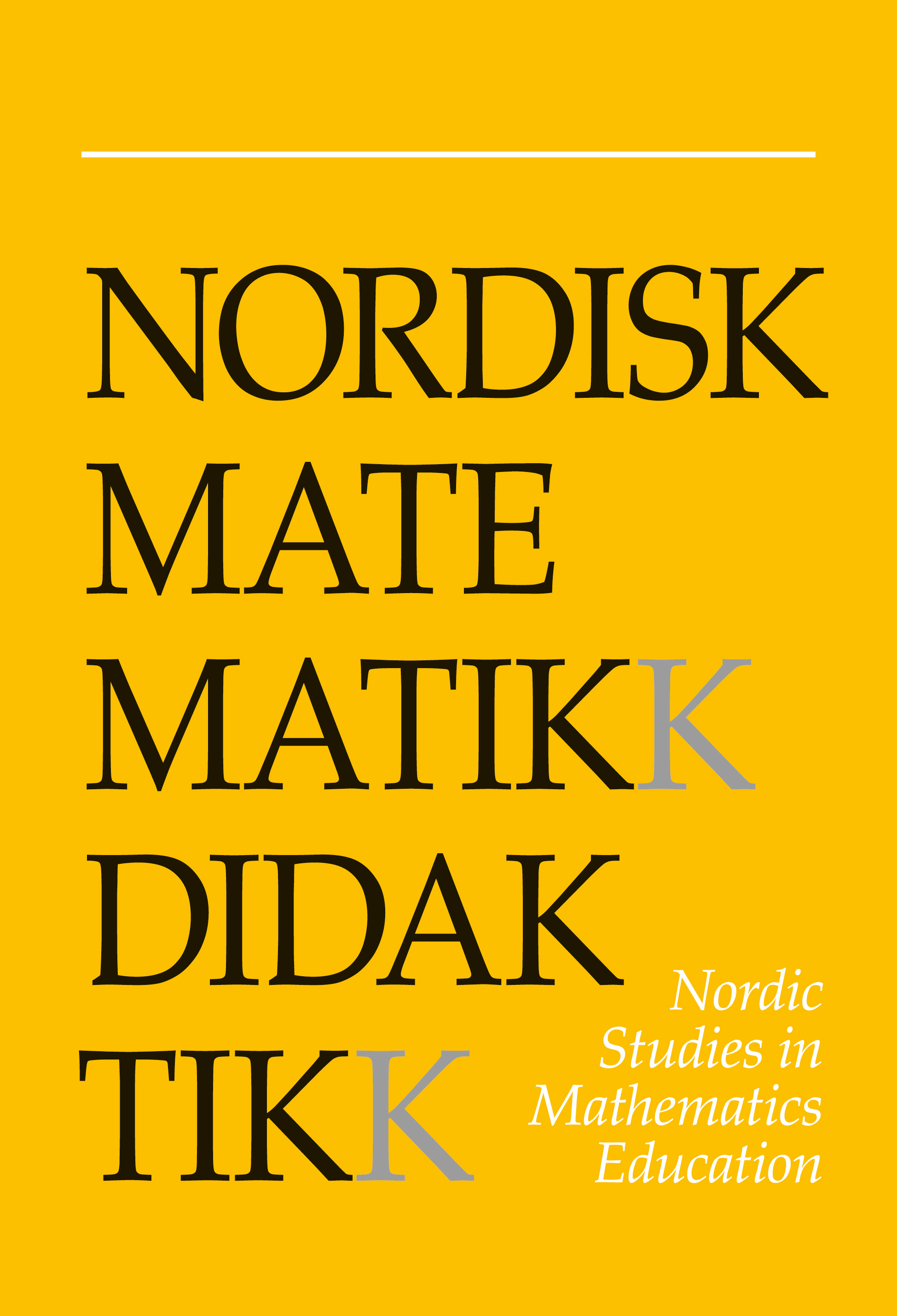
Vol. 22 No. 2 (2017)
Editorial
Hanna Viitala
A tool for understanding pupils’ mathematical thinkingJöran Petersson
First and second language students’ achievement in mathematical content areasReidar Mosvold
Studier av undervisningskunnskap i matematikk: internasjonale trender og nordiske bidragHeidi Strømskag
Et miljø for algebraisk generalisering og dets innvirkning på studenters matematiske aktivitetHelena Johansson
Dependence between creative and non-creative mathematical reasoning in national physics tests -
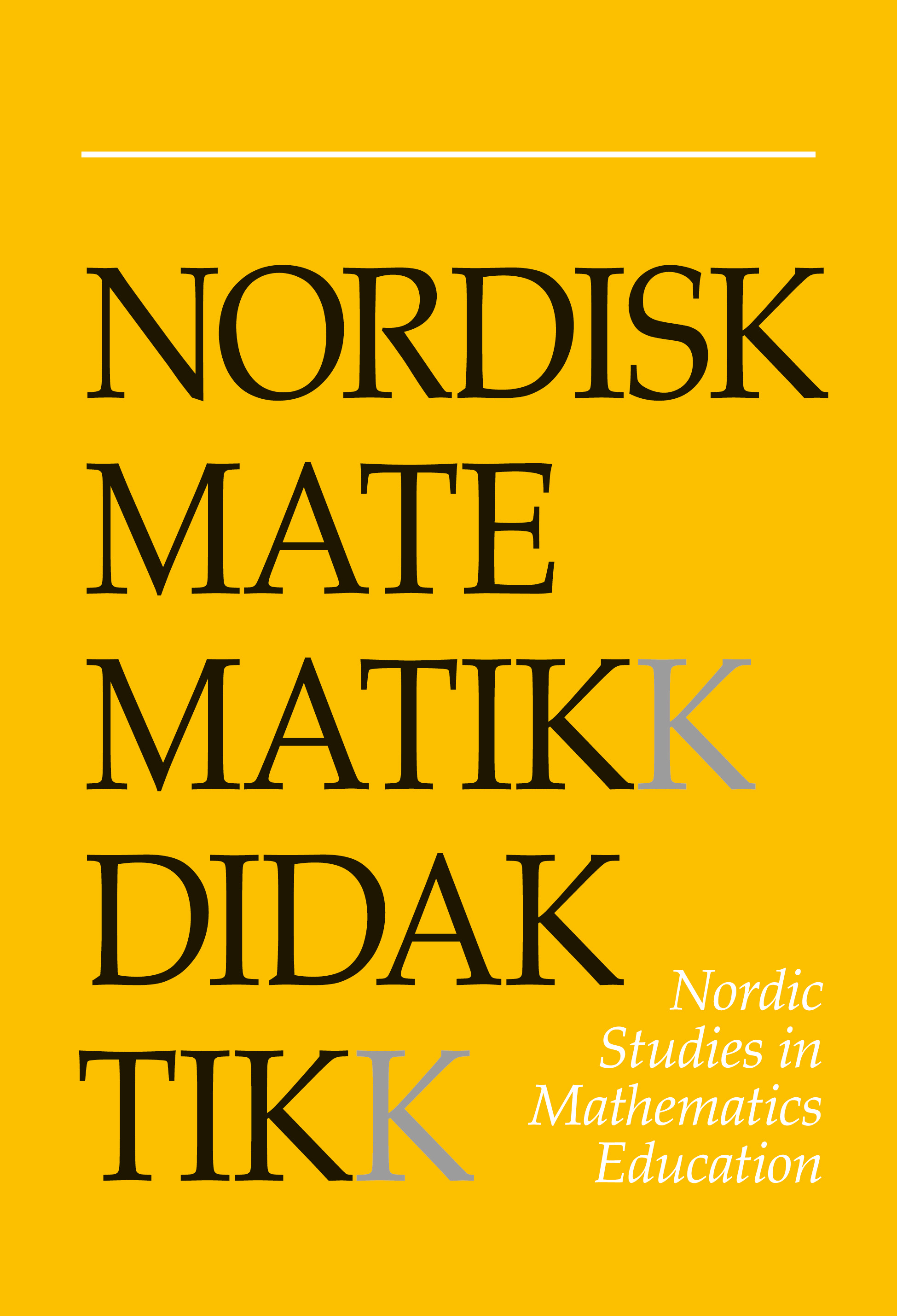
Vol. 22 No. 1 (2017)
Editorial
Catarina Andersson, Erika Boström and Torulf Palm
Formative assessment in Swedish mathematics classroom practiceAttila Szabo
Matematikundervisning för begåvade elever – en forskningsöversiktMary G. Billington and Egil Gabrielsen
The older the better? Are younger Norwegian adults losing ground on basic numeracy skills?Anna Pansell and Paul Andrews
The teaching of mathematical problem-solving in Swedish classrooms: a case study of one grade five teacher’s practiceEva-Lena Erixon
Convergences and influences of discourses in an online professional development course for mathematics teachers -
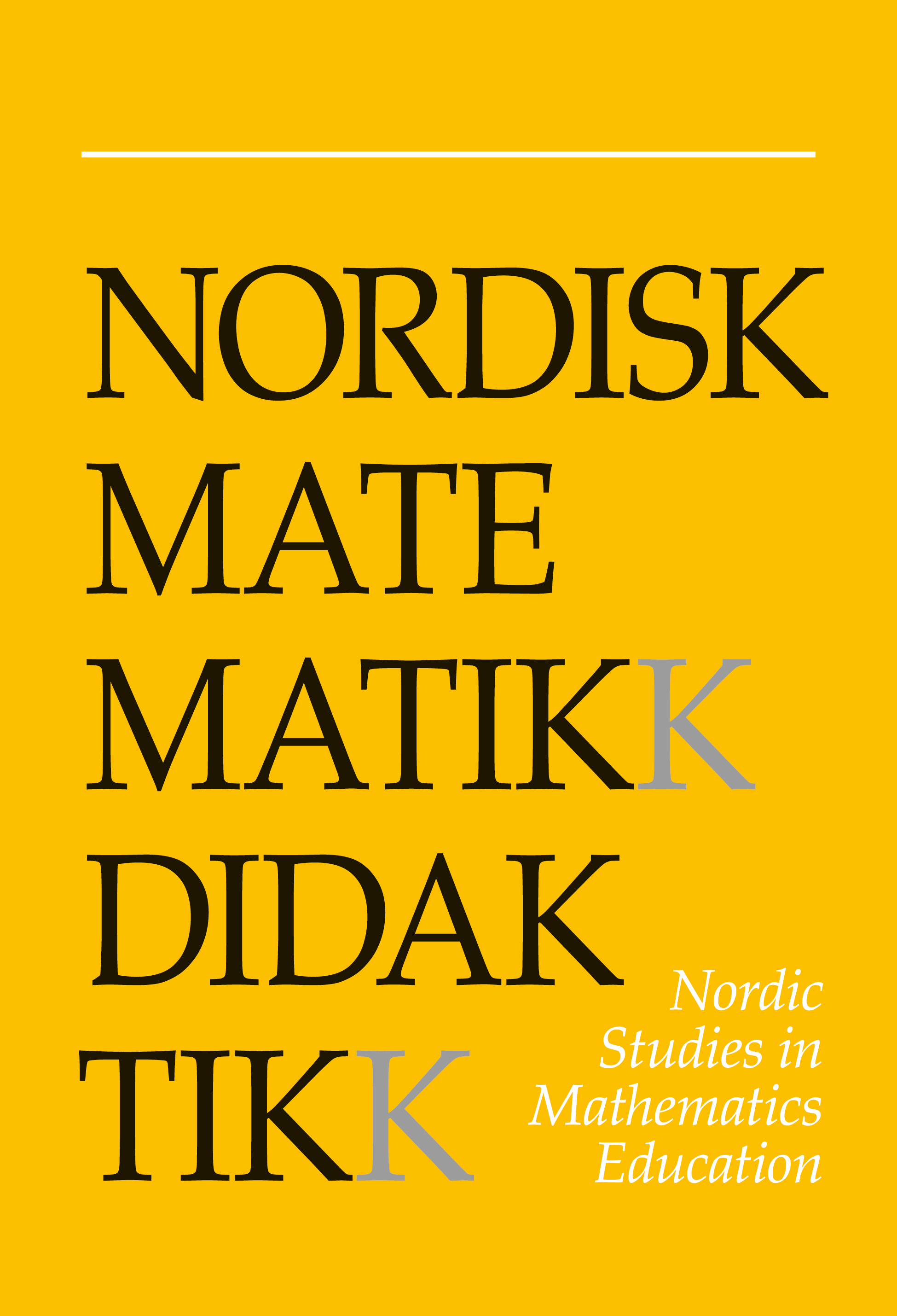
Vol. 21 No. 4 (2016)
Editorial
Tamsin Meaney
Locating learning of toddlers in the individual/society and mind/body dividesJulie Sarama, Douglas H. Clements, Christopher B. Wolfe and Mary Elaine Spitler
Professional development in early mathematics: effects of an intervention based on learning trajectories on teachers’ practicesElin Reikerås
Central skills in toddlers’ and pre-schoolers’ mathematical development, observed in play and everyday activitiesPer-Einar Sæbbe and Reidar Mosvold
Initiating a conceptualization of the professional work of teaching mathematics in kindergarten in terms of discourseJorryt van Bommel and Hanna Palmér
Young children exploring probability – with focus on their documentationsCamilla Björklund and Wolmet Barendregt
Teachers’ pedagogical mathematical awareness in diverse child-age-groupsTrude Fosse
What characterises mathematical conversations in a Norwegian kindergarten?Ola Helenius, Maria L. Johansson, Troels Lange, Tamsin Meaney and Anna Wernberg
Measuring temperature within the didaktic space of preschoolHanna Palmér and Camilla Björklund
Different perspectives on possible – desirable – plausible mathematics learning in preschool -
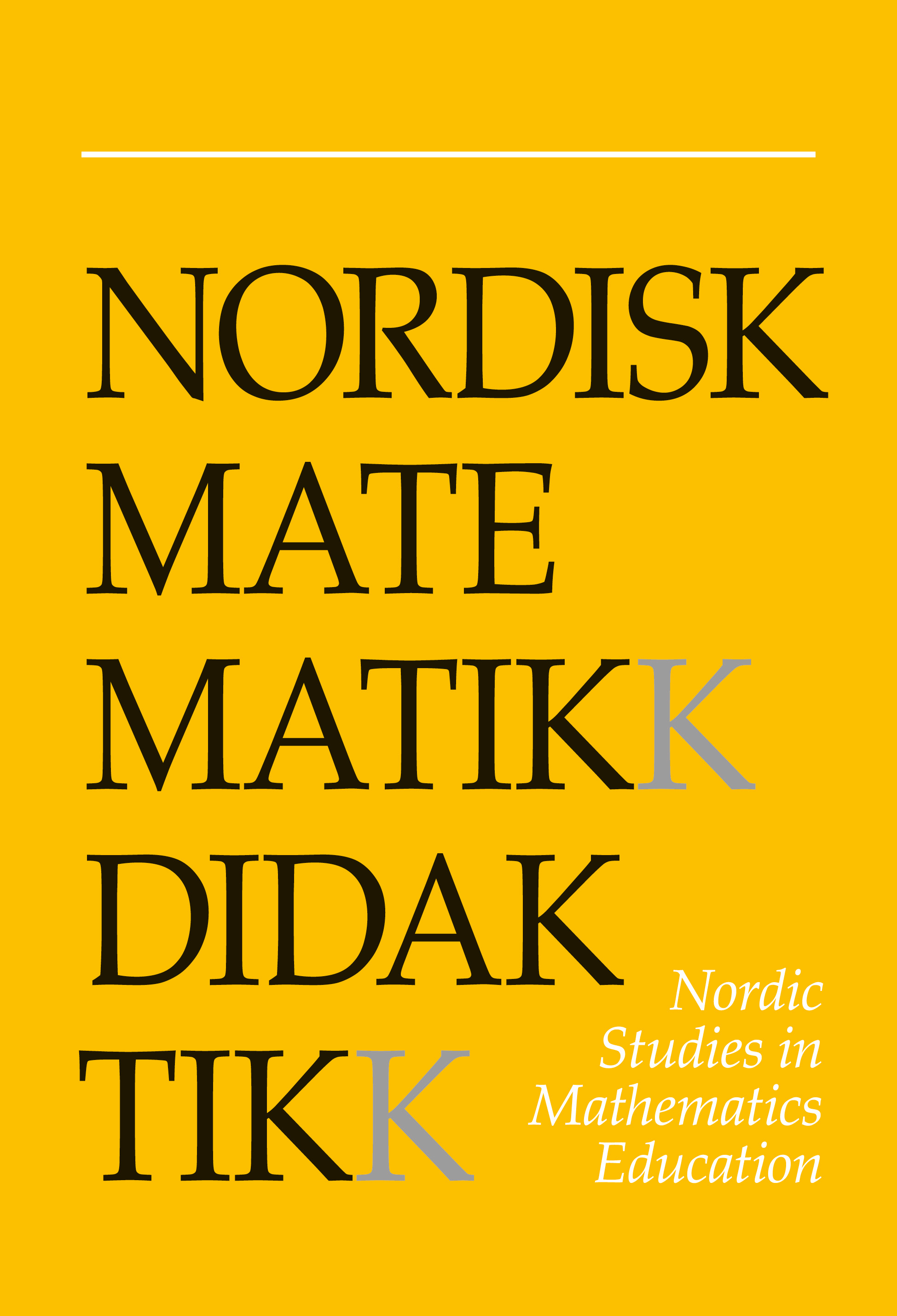
Vol. 21 No. 3 (2016)
Editorial
Yvonne Liljekvist
Mathematics teachers’ knowledge-sharing on the Internet: pedagogical message in instruction materialsEvangelia Triantafyllou, Morten Misfeldt and Olga Timcenko
Attitudes towards mathematics as a subject, and mathematics learning and instruction in a trans-disciplinary engineering studyAnneli Dyrvold
The role of semiotic resources when reading and solving mathematics tasksJanne Fauskanger og Reidar Mosvold
Lærerarbeidets matematiske undervisningsoppgaverShipra Sacheva, Marit Hvalsøe Schou and Andreas Lindenskov Tamborg
Reflections on having participated at the Pre-NORMA workshop -
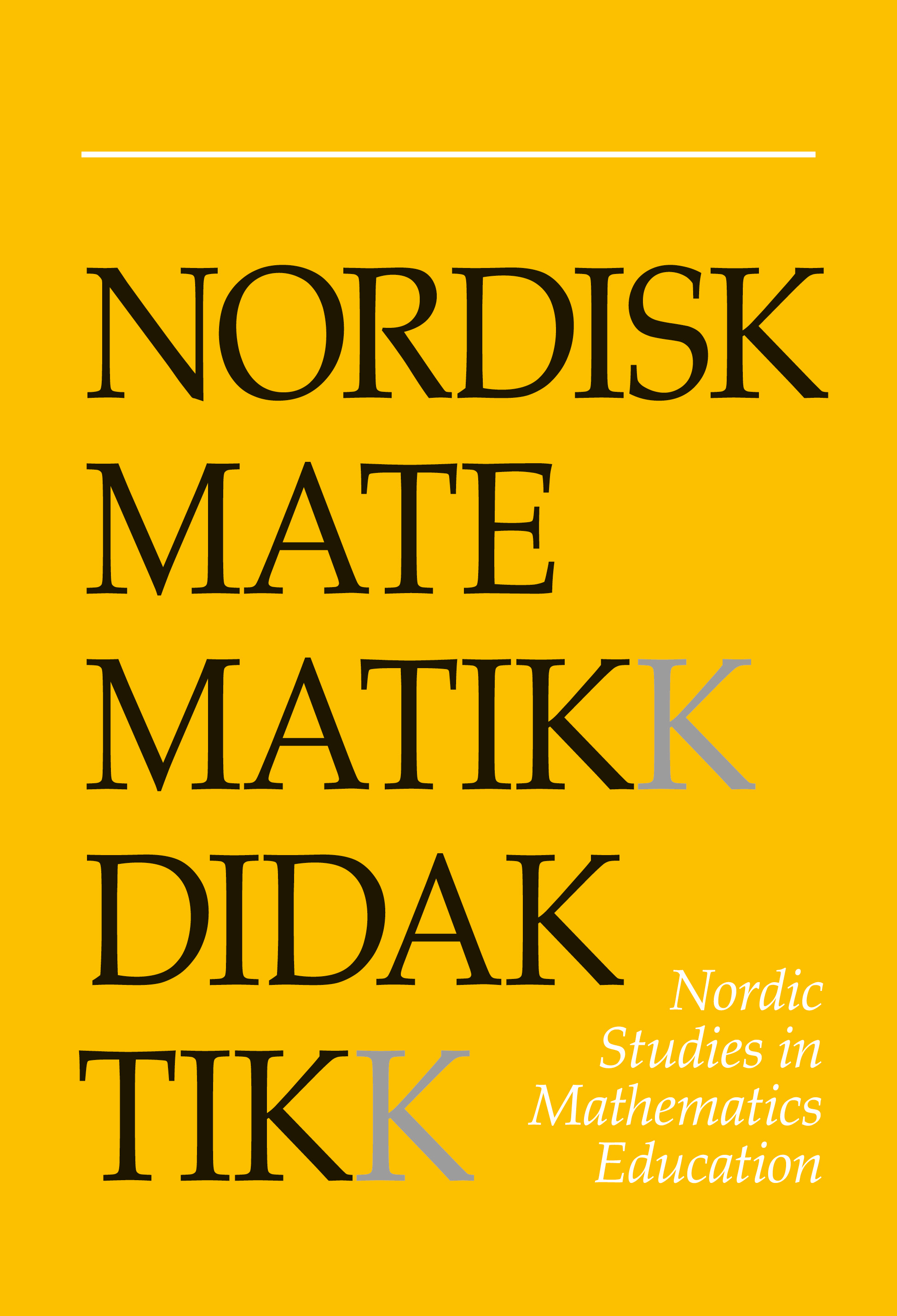
Vol. 21 No. 2 (2016)
Editorial
Florenda Gallos Cronberg
Learning linear relationships through independent use of the mathematics textbookNonmanut Pongsakdi, Teija Laine, Koen Veermans, Minna M. Hannula-Sormunen and Erno Lehtinen
Improving word problem performance in elementary school students by enriching word problems used in mathematics teachingIda Bergvall, Jenny Wiksten Folkeryd and Caroline Liberg
Linguistic features and their function in different mathematical content areas in TIMSS 2011Kerstin Larsson
Finding Erik and Alva: uncovering students who reason additively when multiplyingBarbro Grevholm
Bokanmälan: Fra snublesten til byggesten. Matematikdidaktiske mulighederThematic issue of Nomad – call for papers
-
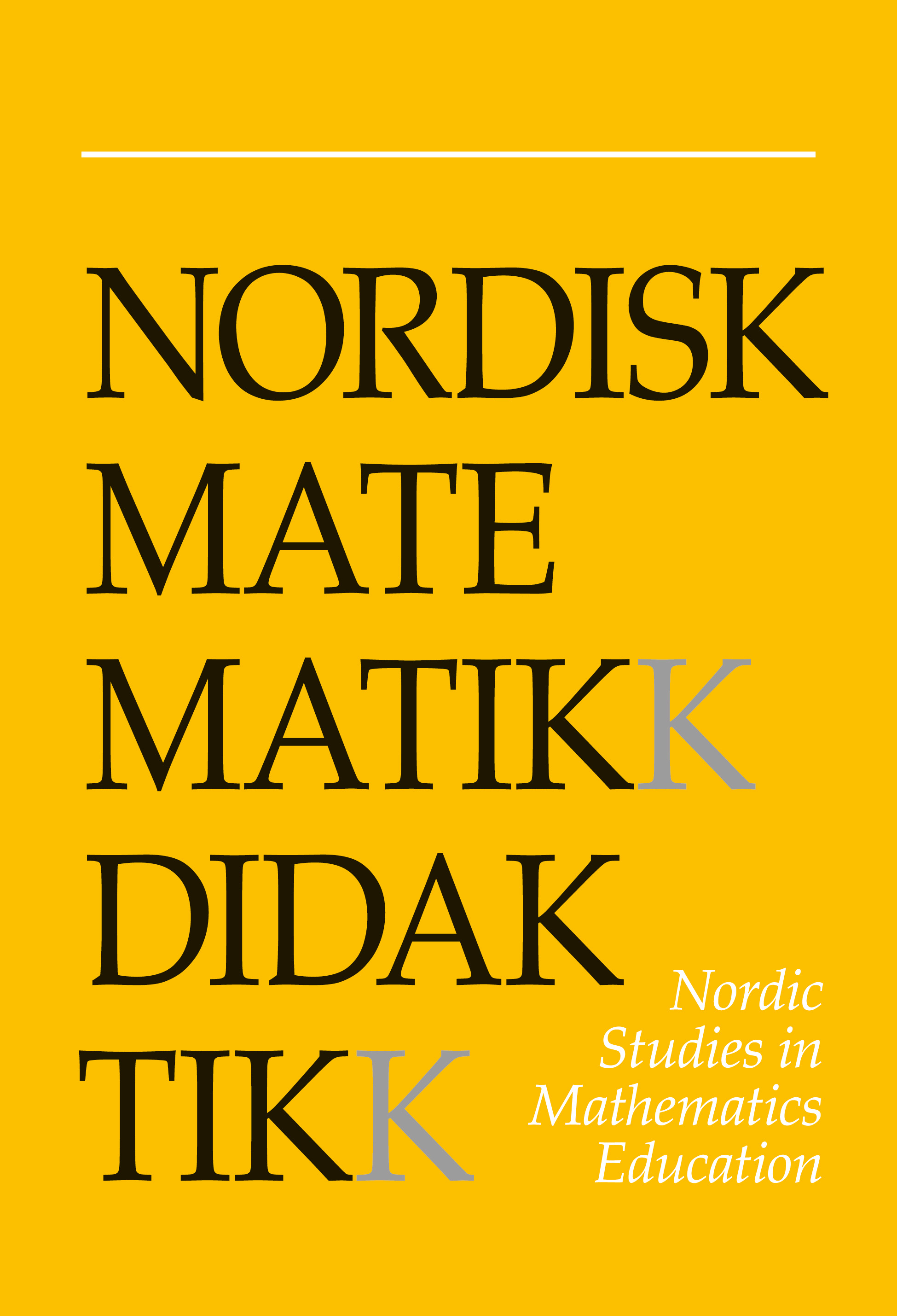
Vol. 21 No. 1 (2016)
Editorial
Elisabeth Rystedt, Cecilia Kilhamn and Ola Helenius
What’s there in an n? Investigating contextual resources in small group discussions concerning an algebraic expressionIngvald Erfjord
Mathematics teachers’ initial implementation of a digital tool packageAnette Bagger
Pressure at stake: Swedish third graders’ talk about national tests in mathematicsJohan Prytz and Martin Karlberg
Nordic school mathematics revisited – on the introduction and functionality of New MathNews from Nordic mathematics education
NORMA 17 – First announcement
-
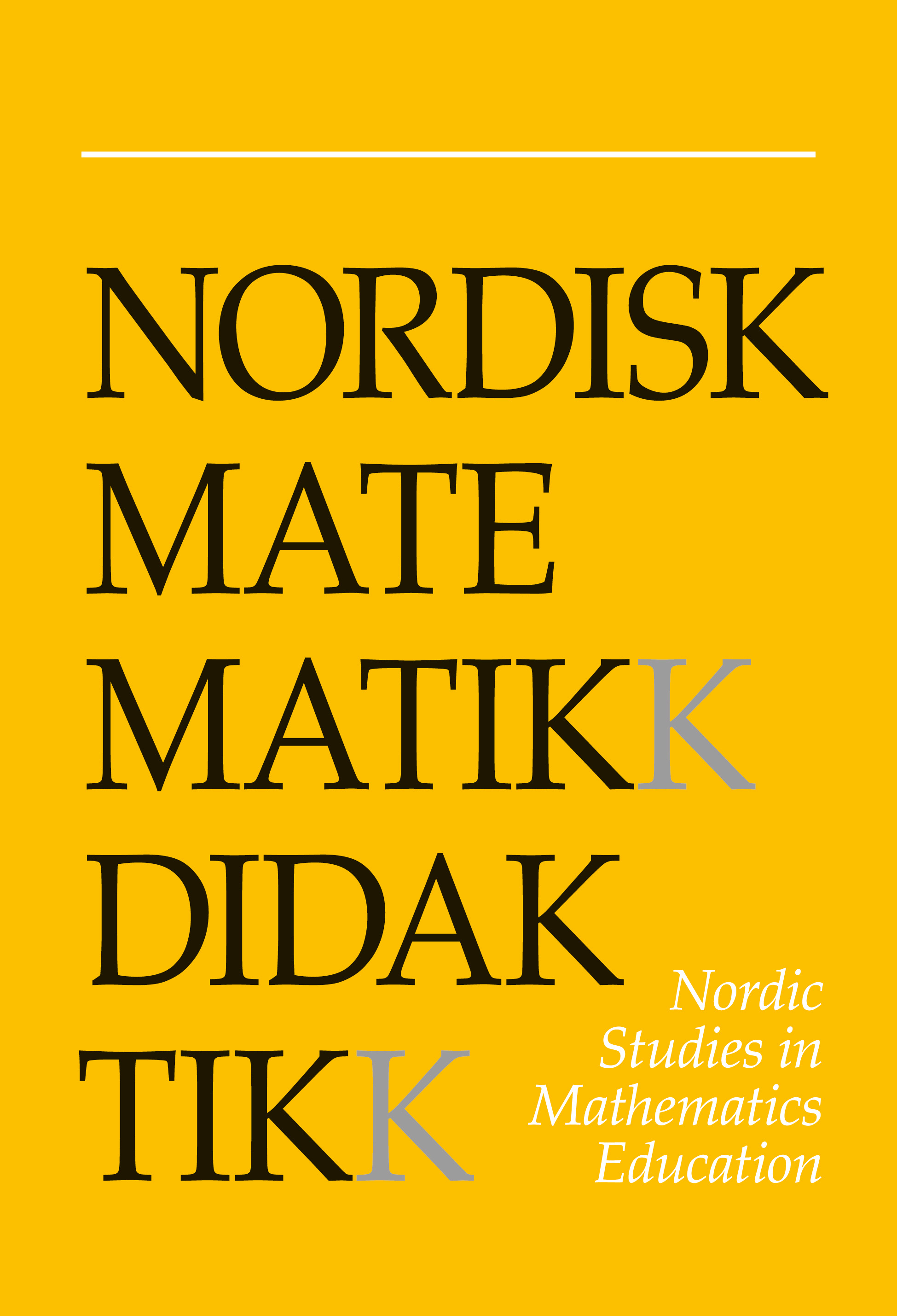
Vol. 20 No. 3-4 (2015)
Editorial
Kristín Bjarnadóttir
Tölur og mengi – Numbers and sets. A New Math textbook in Iceland in the 1960sAndreas Christiansen
An analysis of two 19th century Norwegian geometry books, and the reactions they causedMarc van Zanten and Marja van den Heuvel-Panhuizen
Past and current approaches to decimal numbers in Dutch primary school mathematics textbooksTom Rune Kongelf
Introduksjon av algebra i matematikkbøker for ungdomstrinnet i NorgeRannveig Halldórsdóttir
Comparison of three textbooks published for 8th grade in IcelandMadis Lepik, Barbro Grevholm and Antti Viholainen
Using textbooks in the mathematics classroom – the teachers’ viewAntti Viholainen, Miia Partanen, Jani Piiroinen, Mervi Asikainen and Pekka E. Hirvonen
The role of textbooks in Finnish upper secondary school mathematics: theory, examples and exercisesLinda Ahl, Guðný Helga Gunnarsdóttir, Tuula Koljonen and Guðbjörg Pálsdóttir
How teachers interact and use teacher guides in mathematics – cases from Sweden and IcelandIngvild Lambert Grave and Birgit Pepin
Teachers’ use of resources in and for mathematics teachingRagnhild Johanne Rensaa and Barbro Grevholm
A textbook in linear algebra – the use and views of engineering studentsSebastian Rezat and Rudolf Sträßer
Methodological issues and challenges in research on mathematics textbooks -
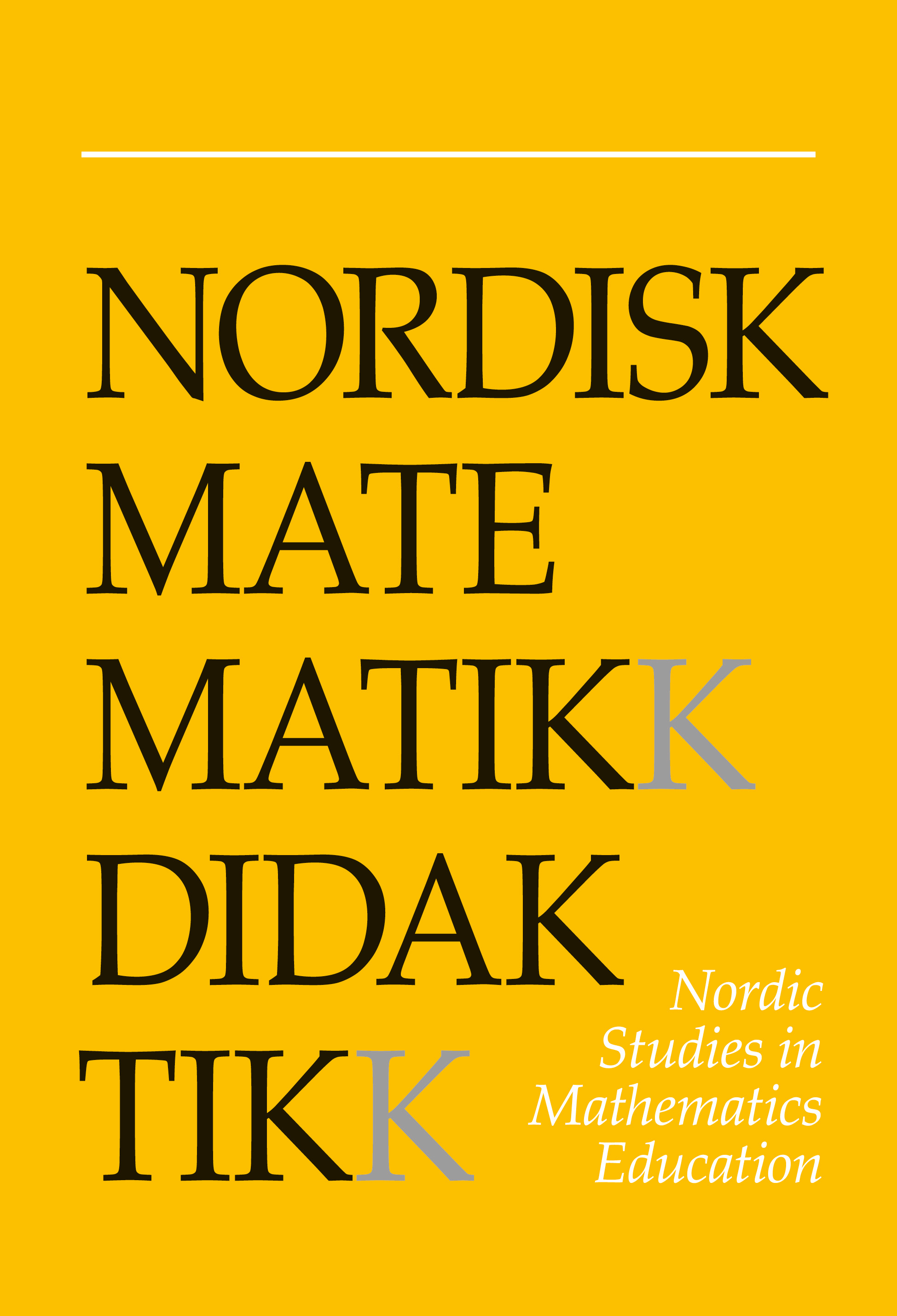
Vol. 20 No. 2 (2015)
Editorial
Ann-Sofi Röj-Lindberg
School mathematical practices as experiences of identity work: the learning journeys of three studentsMaria Christina Secher Schmidt
Sociofaglig inklusion og elevfællesskaber. Til didaktiseringen af kammerathjælp i matematikundervisning på folkeskolens begyndertrinStephanie Treffert-Thomas
Conceptualising a university teaching practice in an activity theory perspectiveJanne Fauskanger and Reidar Mosvold
En metodisk studie av innholdsanalyse – med analyser av matematikklæreres undervisningskunnskap som eksempelMario Sánchez Aguilar
Where’s the ”math” in ”mathematics education”? Review of ”Mathematics and mathematicseducation: searching for common ground”Mette Andresen
News from Nordic mathematics education -
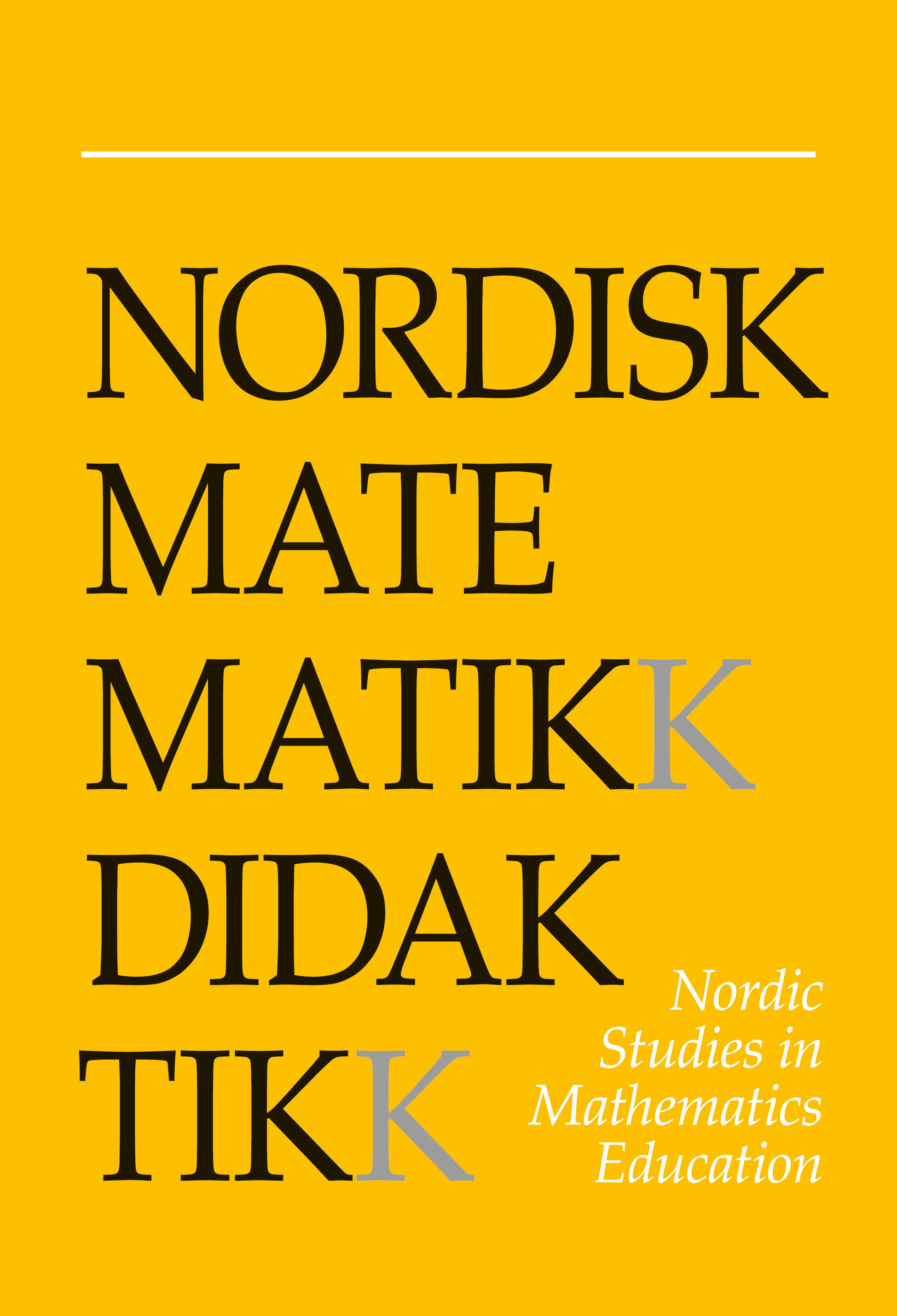
Vol. 20 No. 1 (2015)
Editorial
Anneli Dyrvold, Ewa Bergqvist and Magnus Österholm
Uncommon vocabulary in mathematical tasks in relation to demand of reading ability and solution frequencyAndreas Ebbelind and Cecilia Segerby
Systemic functional linguistics as a methodological tool in mathematics education researchGunnar Sjöberg, Eva Silfver and Anette Bagger
Disciplined by testsCharlotte Krog Skott og Camilla Hellsten Østergaard
Lektionsstudier i dansk læreruddannelseMette Andresen
Message from the Chair of the NoRME board -

Vol. 19 No. 3-4 (2014)
Editorial
Mark Hoover, Reidar Mosvold and Janne Fauskanger
Common tasks of teaching as a resource for measuring professional content knowledge internationallyBjörg Jóhannsdóttir and Berglind Gísladóttir
Exploring the mathematical knowledge of prospective elementary teachers in Iceland using the MKT measuresJanne Fauskanger and Reidar Mosvold
Studying teachers’ knowledge by the use of multiple-choice items: the case of ”I’m not sure”Hege Kaarstein
Norwegian mathematics teachers’ and educational researchers’ perception of MPCK items used in the TEDS-M studyCecilia Kilhamn
When does a variable vary? Identifying mathematical content knowledge for teaching variablesFrode Opsvik og Leif Bjørn Skorpen
Matematisk kvalitet i undervisningBodil Kleve and Ida Heiberg Solem
Aspects of a teacher’s mathematical knowledge in his orchestration of a discussion about rational numbersArne Jakobsen, C. Miguel Ribeiro and Maria Mellone
Norwegian prospective teachers’ MKT when interpreting pupils’ productions on a fraction taskOve Gunnar Drageset
Knowledge used when orchestrating mathematical discourses – doing, guiding and requestingBjørn Smestad, Uffe Thomas Jankvist and Kathleen Clark
Teachers’ mathematical knowledge for teaching in relation to the inclusion of history of mathematics in teachingJorryt van Bommel
The teaching of mathematical knowledge for teaching – a learning study of primary school teacher education -
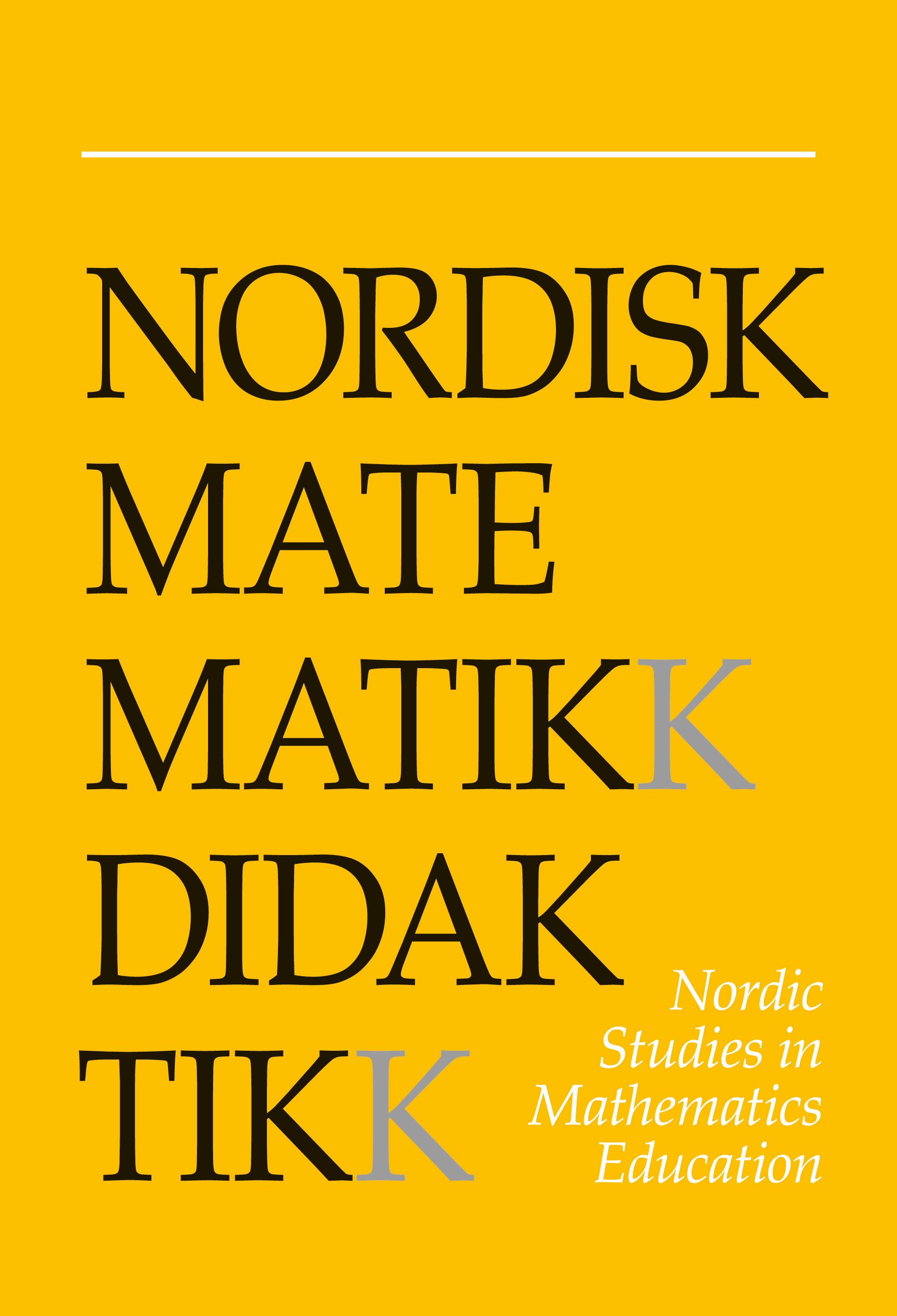
Vol. 19 No. 2 (2014)
Editorial
Indrek Kaldo
View of mathematics – an investigation of Estonian university studentsEugenia Koleza
Students’ conceptions about the formula for a rectangle’s area and some similarities to its historical contextAndreas Lorange and Reinert A. Rinvold
Students’ strategies of expanding fractions to a common denominator – a semiotic perspectiveKristina Juter and Jan-Fredrik Olsen
”Just-in-time teaching” in undergraduate mathematics -
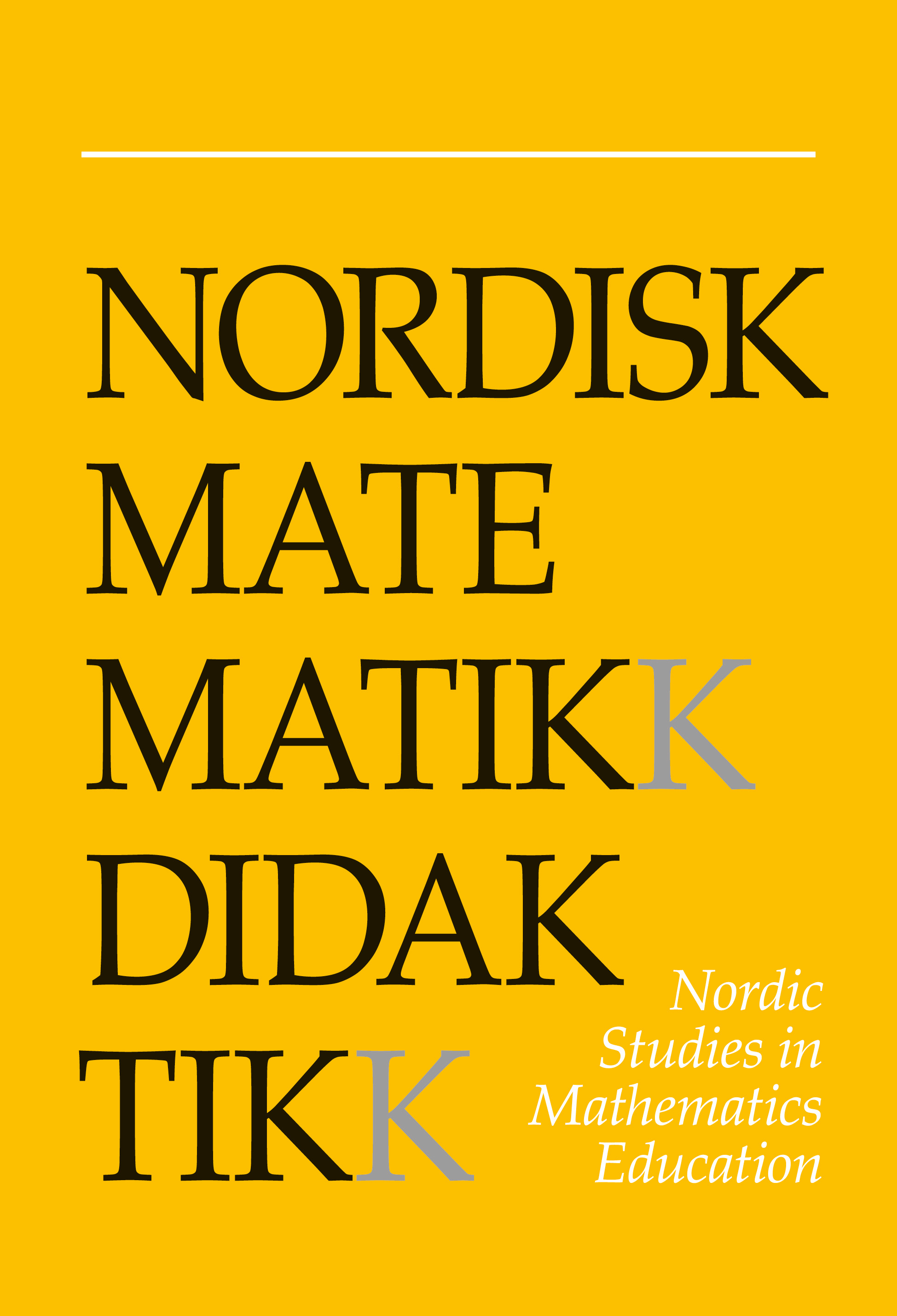
Vol. 19 No. 1 (2014)
Editorial
Indrek Kaldo and Markku S. Hannula
Gender differences favouring females in Estonian university students’ views of mathematicsHege Kaarstein
A comparison of three frameworks for measuring knowledge for teaching mathematicsRaymond Bjuland, Arne Jakobsen og Elaine Munthe
Muligheter og begrensninger for studenters læring i praksisopplæring – eksempel fra en førveiledningsdialog i matematikkChrister Bergsten
News from Nordic mathematics education -
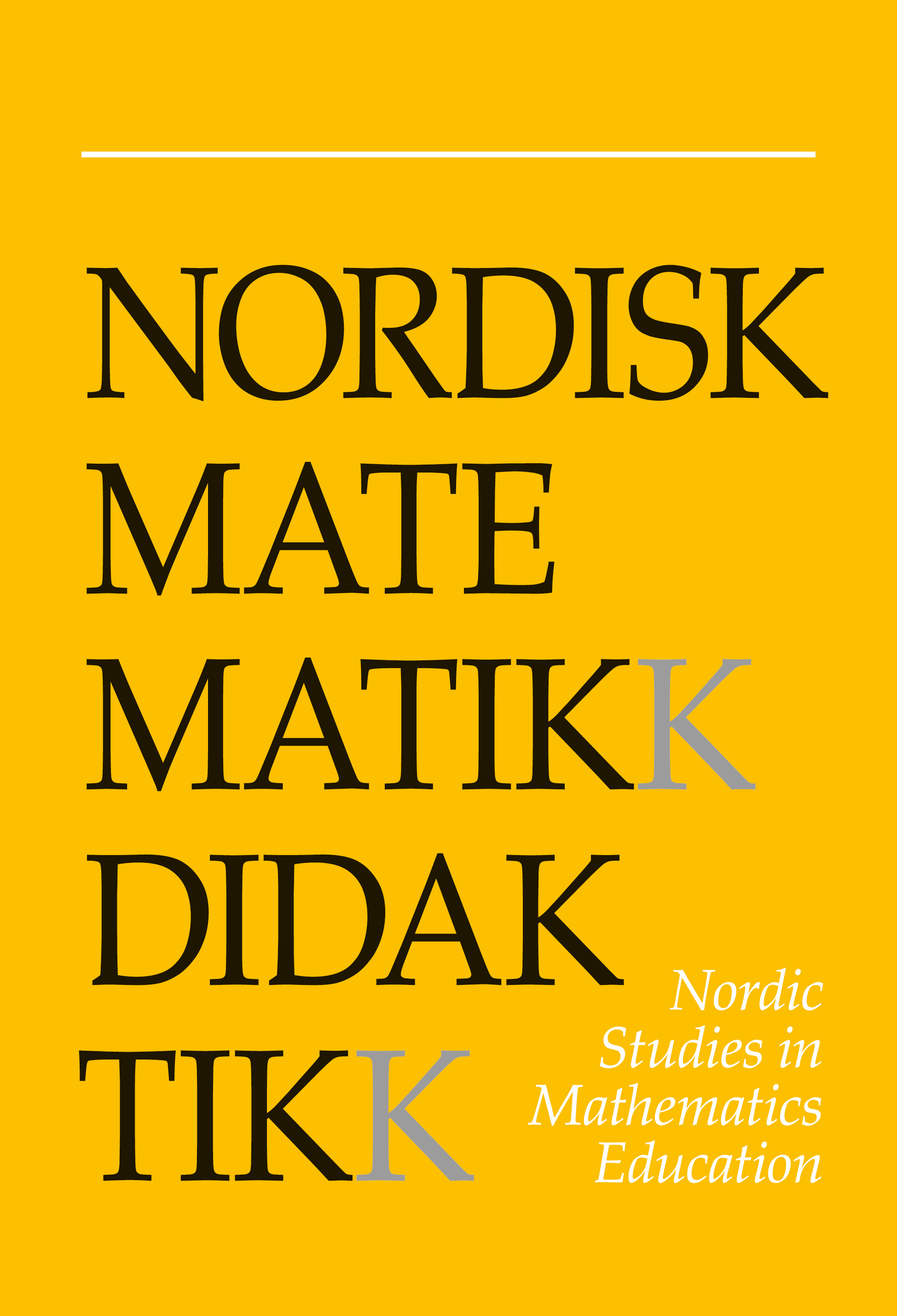
Vol. 18 No. 4 (2013)
Editorial
Theodosia Prodromou
A modelling approach to probability – analysing students’ conceptual structuresJudith Stanja
The first foci of elementary school students dealing with prognosis tasks in interviewsPer Nilsson and Torsten Lindström
Prolifing Swedish teachers’ knowledge base in probability -
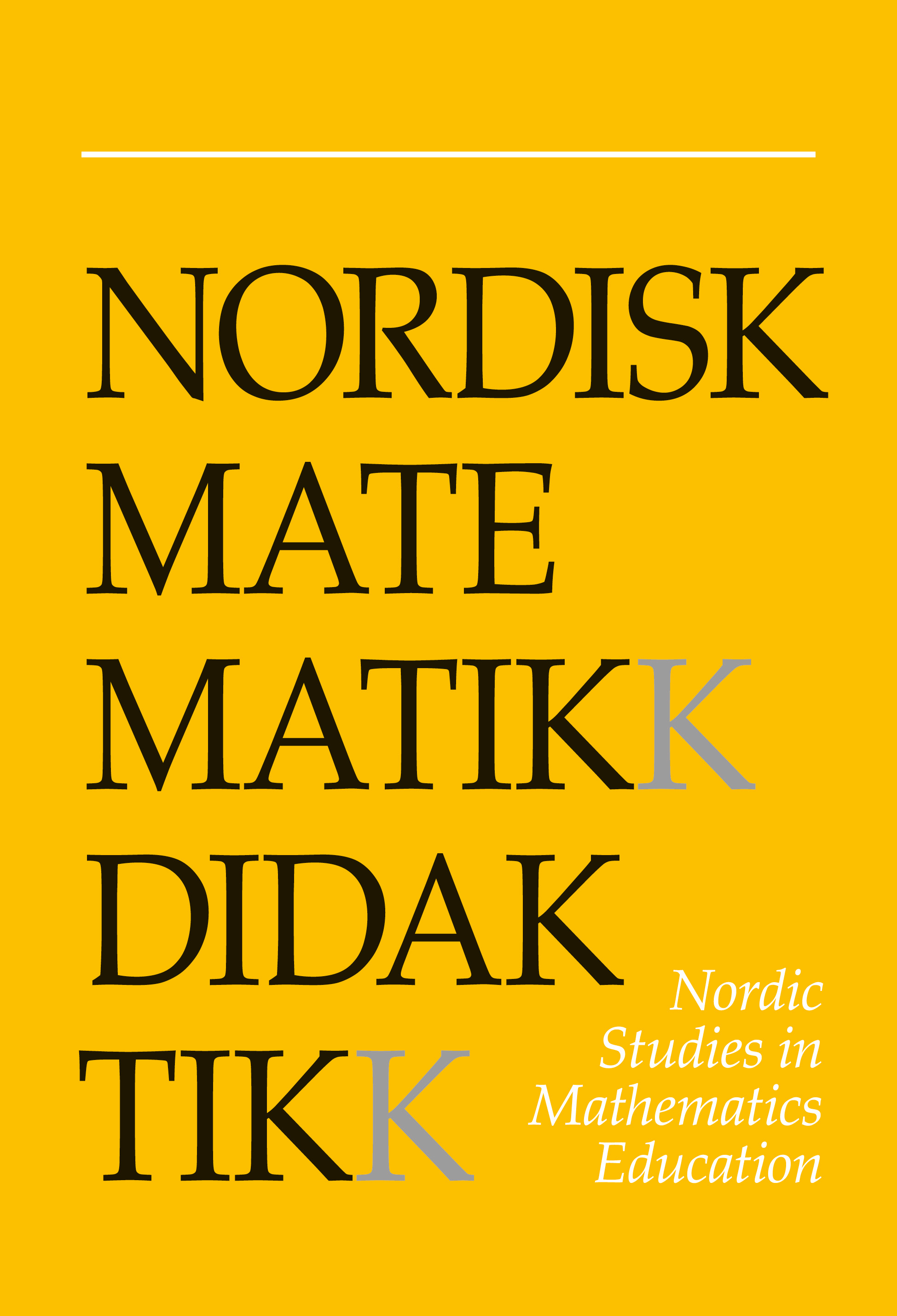
Vol. 18 No. 3 (2013)
Editorial
Martin Carlsen
Barns bruk av digitale verktøy i barnehagen: muligheter for å gjøre seg matematiske erfaringerKristín Bjarnadottír, Andreas Christiansen and Madis Lepik
Arithmetic textbooks in Estonia, Iceland and Norway – similarities and differences during the nineteenth centuryPeter Frejd
An analysis of mathematical modelling in Swedish textbooks in upper secondary schoolFirst Announcement – NORMA 14, June 3rd–6th 2014
-

Vol. 18 No. 2 (2013)
Editorial
Dagmar Neuman
Att ändra arbetssätt och kultur inom den inledande aritmetikundervisningenMarkus Hähkiöniemi, Henry Leppäaho and John Francisco
Teacher-assisted open problem solvingUffe Thomas Jankvist, Jan Alexis Nielsen and Claus Michelsen
Preparing future teachers for interdisciplinarity: designing and implementing a course for pre-service upper secondary teachersChrister Bergsten
News from Nordic mathematics education -
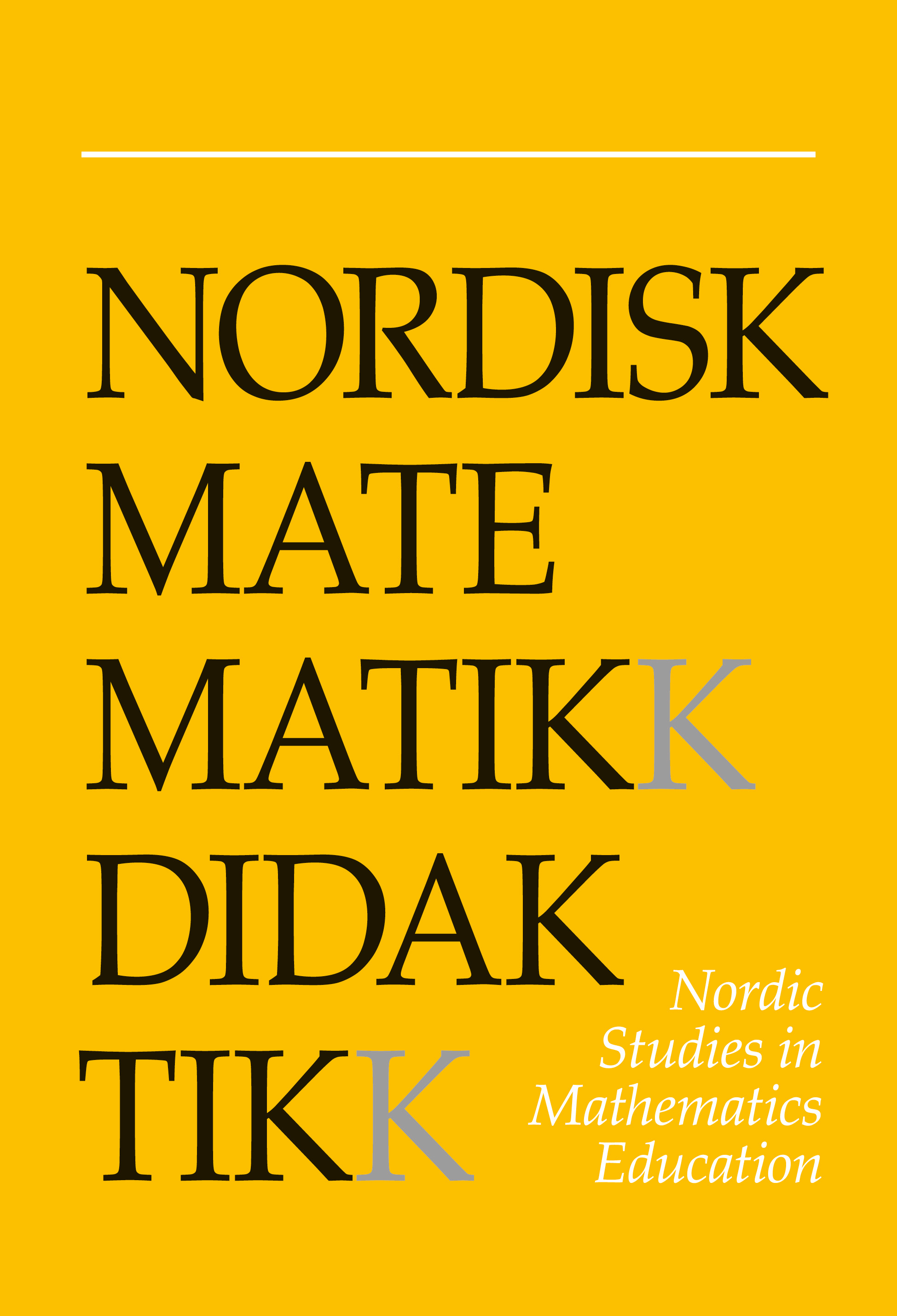
Vol. 18 No. 1 (2013)
Ledare/Editorial
Oduor Olande
Making sense of a ”misleading” graphAnita Valenta and Ole Enge
Student teachers’ work on instructional explanations in multiplication – representations and conversions between themIda Friestad Pedersen
”I need advanced mathematics to pursue the career of my choice”. Norwegian students’ motivations for enrolling in mathematics and plans for post-secondary studies -

Vol. 17 No. 3-4 (2012)
Ledare/Editorial
Erkki Pehkonen
Research on mathematical beliefs. The birth and growth of the MAVI group in 1995–2012Peter Liljedahl, Susan Oesterle and Christian Bernèche
Stability of beliefs in mathematics education: a critical analysisAnu Laine, Liisa Näveri, Maija Ahtee, Markku S. Hannula and Erkki Pehkonen
Emotional atmosphere in third-graders’ mathematics classroom – an analysis of pupils’ drawingsInés Mª Gómez-Chacón
Affective pathways and interactive visualization in the context of technological and professional mathematical knowledgeChiara Andrà and Guido Magnano
Interplay of cognition and affect in undergraduate math students’ careers: insights from recursive partitioningFulvia Furinghetti, Chiara Maggiani and Francesca Morselli
How mathematics students perceive the transition from secondary to tertiary level with particular reference to proofCristina Coppola, Pietro Di Martino, Tiziana Pacelli and Cristina Sabena
Primary teachers’ affect: a crucial variable in the teaching of mathematicsSonja Lutovac and Raimo Kaasila
Dialogue between past and future mathematical identitiesHanna Palmér
(In)consistent? The mathematics teaching of a novice primary school teacherPäivi Portaankorva-Koivisto
Prospective mathematics teachers’ metaphors for mathematics, teaching, and the teacher’s roleMadis Lepik, Anita Pipere and Markku S. Hannula
Comparing mathematics teachers’ beliefs about good teaching: the cases of Estonia, Latvia and FinlandIgor’ Kontorovich and Boris Koichu
Feeling of innovation in expert problem posing -
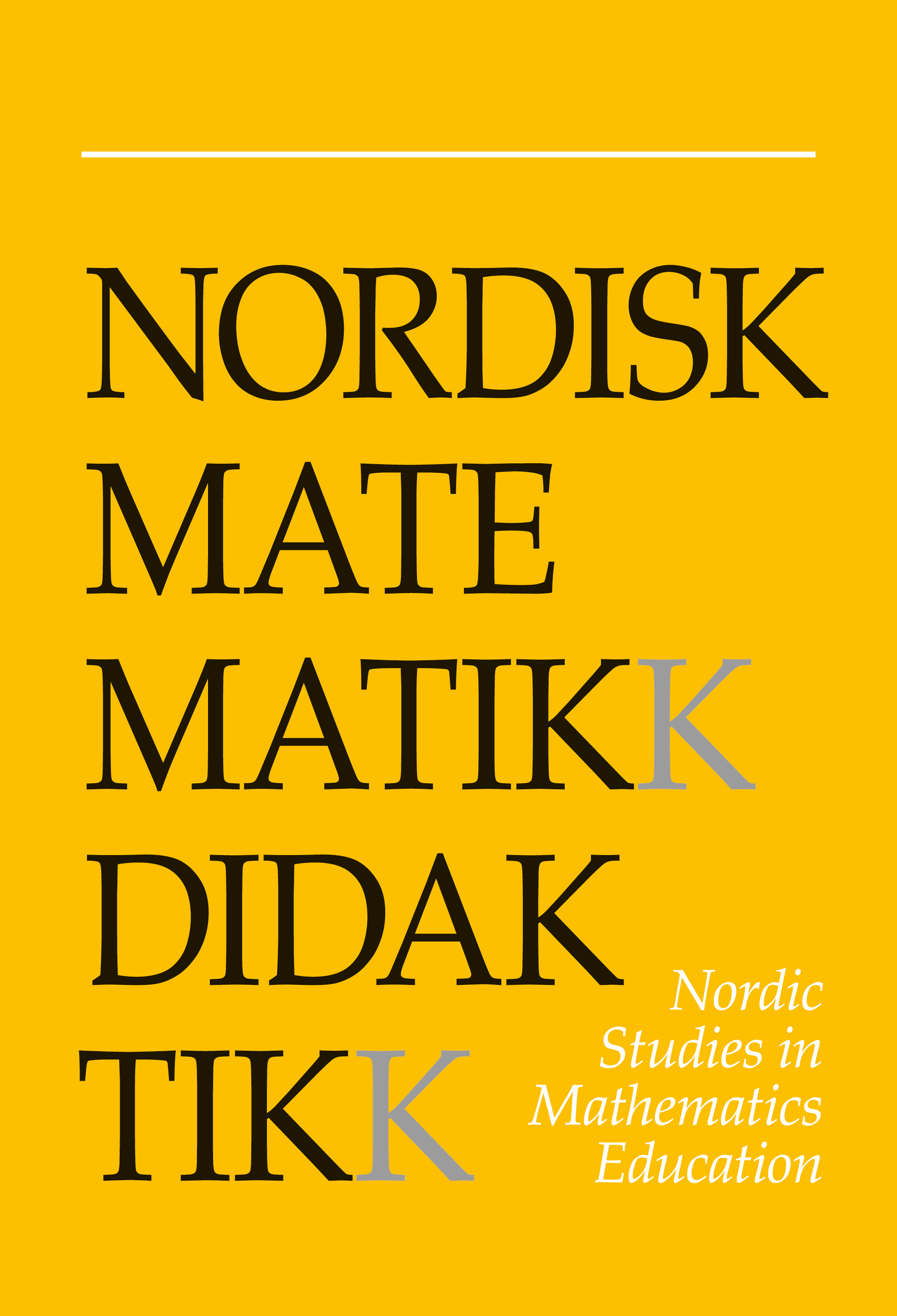
Vol. 17 No. 2 (2012)
Ledare/Editorial
Indrek Kaldo and Markku S. Hannula
Structure of university students’ view of mathematics in EstoniaLovisa Sumpter
Upper secondary school students’ gendered conceptions about affect in mathematicsMahmoud Abdulwahed, Barbara Jaworski and Adam R. Crawford
Innovative approaches to teaching mathematics in higher education: a review and critiqueChrister Bergsten
News from Nordic mathematics education -
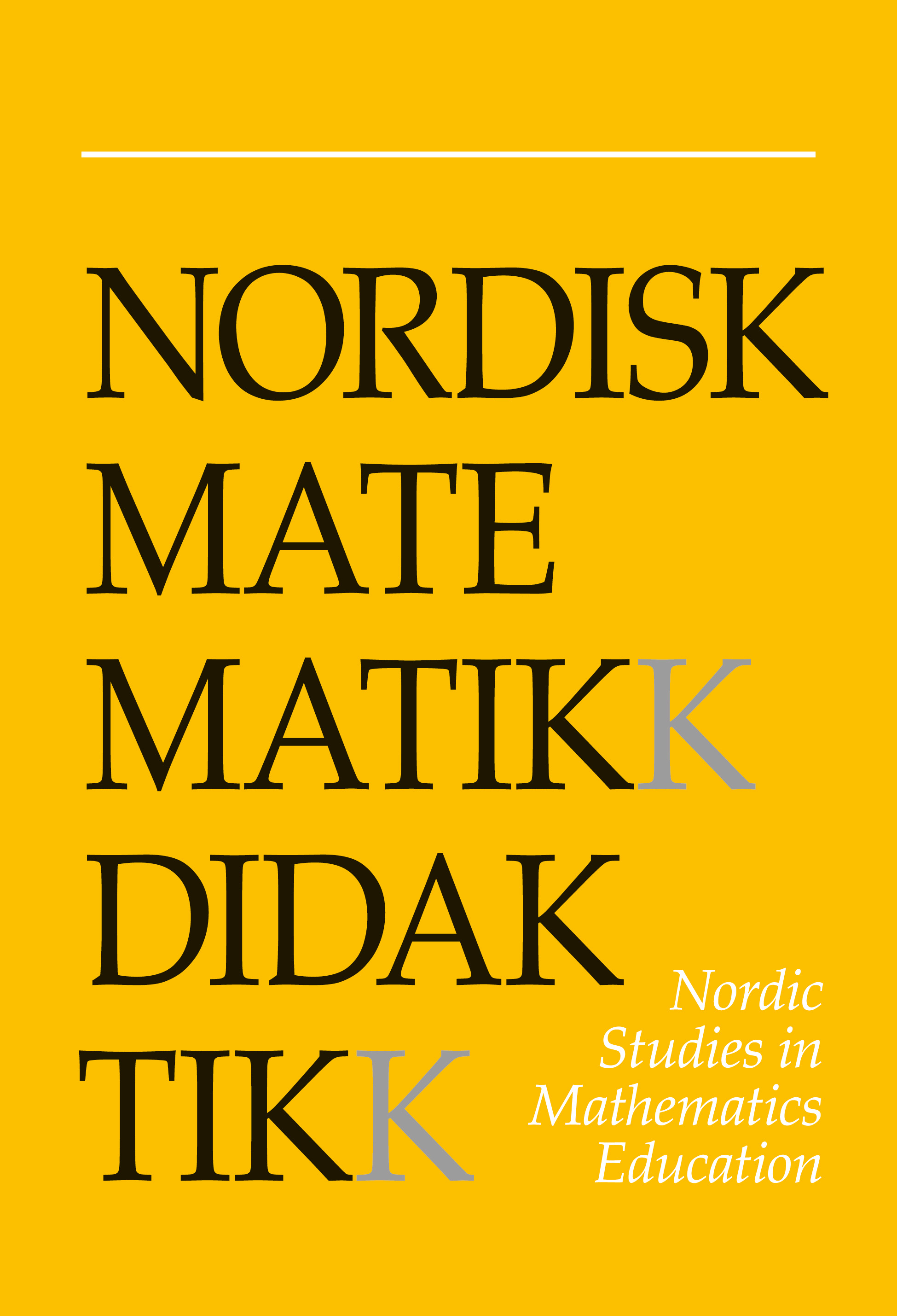
Vol. 17 No. 1 (2012)
A new editorial team
Magnus Österholm and Ewa Bergqvist
Methodological issues when studying the relationship between reading and solving mathematical tasksJohn Francisco and Gunnar Gjone
Using strands of tasks to promote growth of students’ mathematical understandingPer-Olof Bentley
Interference of subtraction strategies -
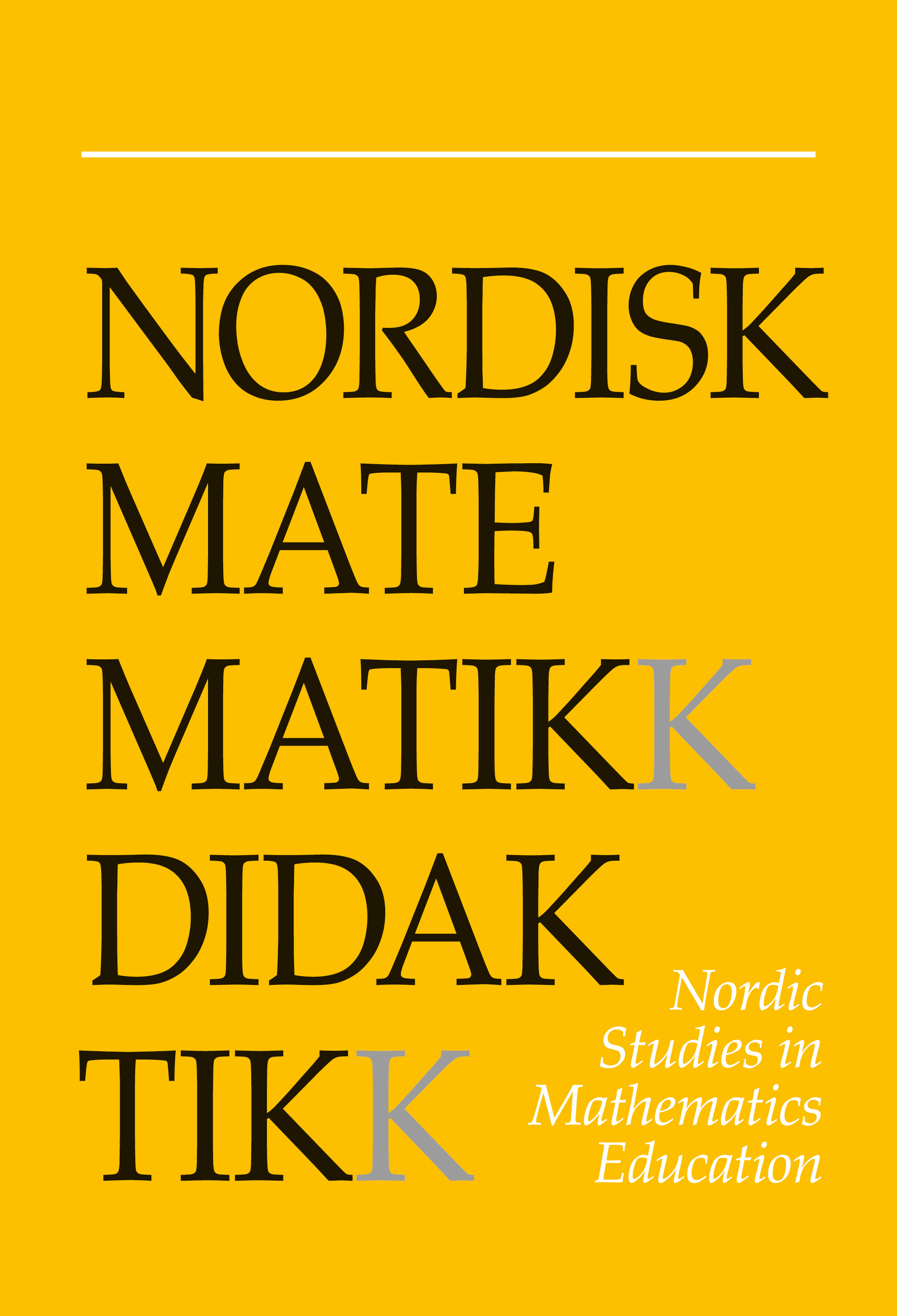
Vol. 16 No. 4 (2011)
Ledare/Editorial
About this issueTom Rune Kongelf
What characterises the heuristic approaches in mathematics textbooks used in lower secondary schools in Norway?Janne Fauskanger, Reidar Mosvold, Raymond Bjuland and Arne Jakobsen
Does the format matter? How the multiple-choice format might complicate the MKT itemsMiika Vähämaa and Kennet Härmälä
Comparing perceptions of mathematics: Norwegian and Finnish university students‘ definitions of mathematicsBarbro Grevholm
Network for research on mathematics textbooks in the Nordic countriesChrister Bergsten
News from Nordic mathematics education -

Vol. 16 No. 3 (2011)
Ledare/Editorial
Anne Birgitte Fyhn
Introduksjon til vektorer i norske lærebøker og i en undervisningsfilmJoakim Samuelsson
Development of self-regulated learning skills in mathematics in lower secondary school in SwedenLaia Saló i Nevado, Gunilla Holm and Leila Pehkonen
Farmers do use mathematics: the case of animal feedingSimon Goodchild
Mathematics education PhD summer school 2011 -
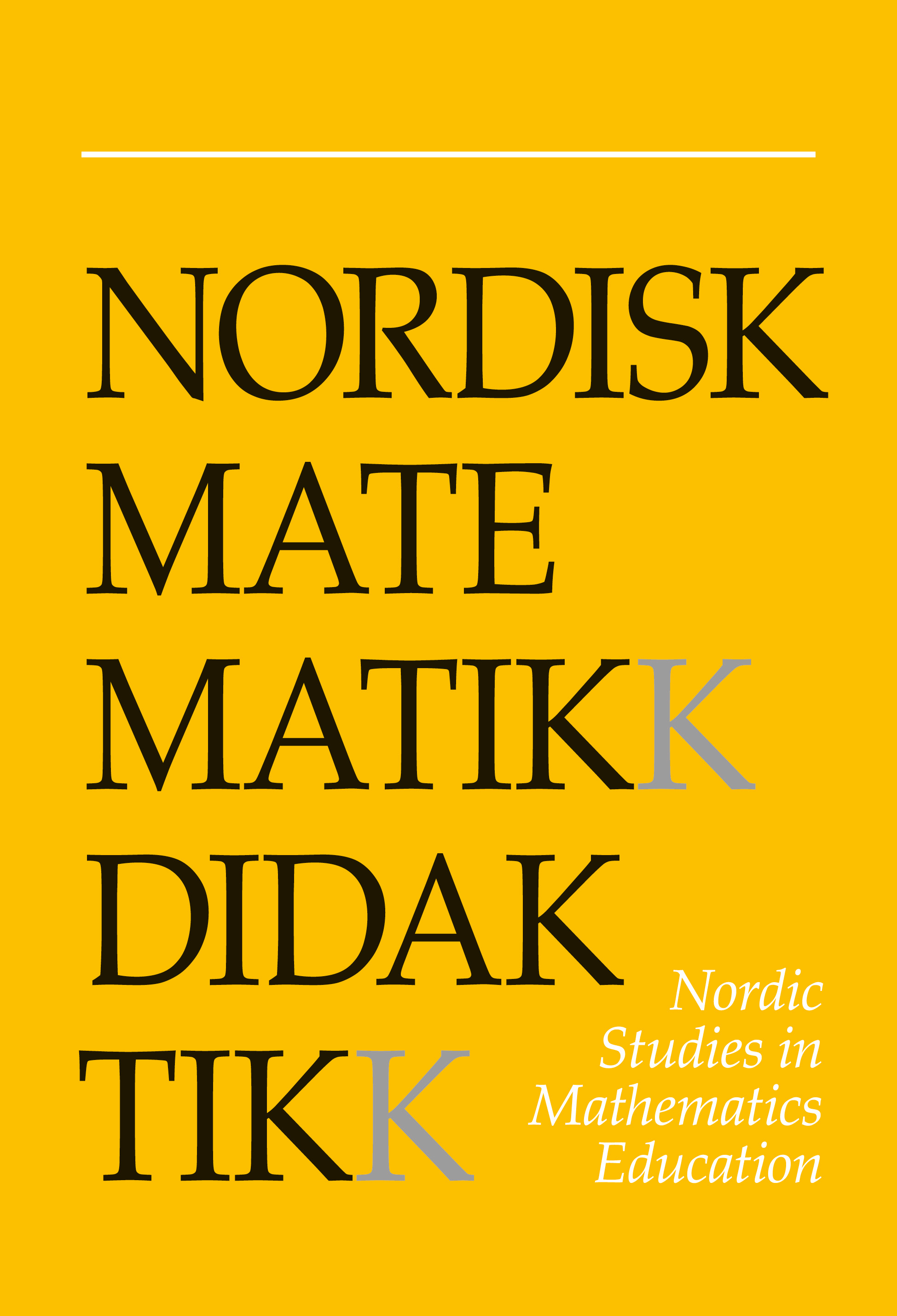
Vol. 16 No. 1-2 (2011)
Ledare/Editorial
Belief research in mathematics educationPeter Liljedahl
The theory of conceptual change as a theory for changing conceptionsJeppe Skott, Dorte Moeskær Larsen and Camilla Hellsten Østergaard
From beliefs to patterns of participation – shifting the research perspective on teachersMagnus Österholm
To translate between different perspectives in belief research: a comparison between two studiesIndrek Kaldo
Structure of students’ view of mathematics in the Estonian Business SchoolEva Norén
Students’ mathematical identity formations in a Swedish multilingual mathematics classroomFrode Rønning
News from Nordic mathematics education


